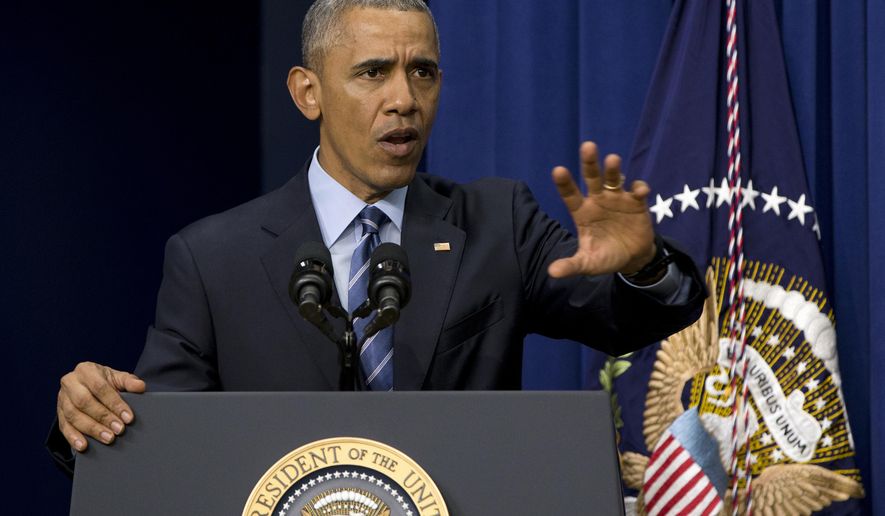President Obama distanced himself Friday from his administration’s allies calling opponents of the Iran nuclear deal “warmongers.”
“At no time have I suggested that somebody is a warmonger, meaning they want war,” Mr. Obama said in a webcast with U.S. Jewish groups. But he said if Congress votes to kill the agreement next month, military action will be likely against Tehran.
“At that point we really don’t have options,” the president said. “We’re kind of flying blind. The logical conclusion is that for any president, me or my successor, to make sure that Iran’s not getting a nuclear weapon, I’m going to have to resort to some sort of military action because there aren’t going to be many other options left to us.”
He added, “That’s not to suggest that opponents of this deal want war. It is a sober analysis of what options we have available to us.”
Earlier Friday, the administration characterized Republican opponents of the deal such as GOP presidential front-runner Donald Trump as “pro-war.” White House press secretary Josh Earnest said the characterization is “not a stretch,” saying that if Congress votes to kill the deal, it would likely lead to military conflict with Iran.
“Once that military conflict starts, it’s difficult to see where that path ends,” Mr. Earnest said, adding that it could be “a broad military conflict.”
Continuing his push ahead of a congressional vote next month, Mr. Obama said the nuclear deal with Iran is the best diplomatic solution to preventing Tehran from building nuclear weapons.
“This deal blocks every pathway that Iran might take in order to obtain a nuclear weapon,” Mr. Obama said. “For the first 10 years … we severely constrain any nuclear program.”
Some prominent Jewish lawmakers in Congress have said they’ll vote against the deal, including Sen. Charles E. Schumer of New York, the likely next leader of Senate Democrats. Israeli Prime Minister Benjamin Netanyahu also is a forceful opponent of the agreement, which would limit Iran’s nuclear capabilities in return for lifting economic sanctions.
The president said international inspections of Iran will be “more rigorous than anything that has been negotiated in history,” but acknowledged there is still concern about the possibility of Tehran cheating.
“Because of the stringency of the deal, the vast majority of experts on nuclear proliferation have endorsed this deal,” Mr. Obama said. “The world is more or less united, with some significant exceptions — the state of Israel, and perhaps others less publicly.”
• Dave Boyer can be reached at dboyer@washingtontimes.com.




Please read our comment policy before commenting.